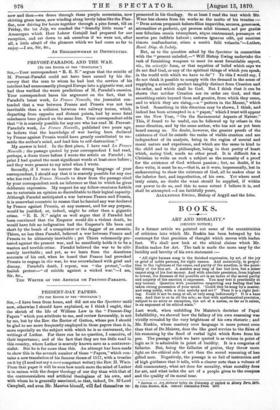PRESENT-DAY PAPERS.
[TO TEE EDITOR OF THE "SPECTATOR:1
SIR,—I have been from home, and did not see the Spectator until now, otherwise I should have explained, as I think I ought, that the sketch of the life of William Law in the "Present-Day Papers" which you attribute to me, and review favourably, is not by me, but by the Rev. the Rector of Gatton, whose pen I should be glad to see more frequently employed in those papers than it is, more especially on the subject with which he is so conversant, the writings of Luther. For there can be no question, I conceive, of their importance ; and of the fact that they are too little read in this country, where Luther is scarcely known save as a controver- sialist. But he is far more than this. An attempt has been made to show this in the seventh number of these "Papers," which con- tains a new translation of his famous theses of 1517, with a treatise on it by (I need not say a Mg competent writer) the Rev. H. Wace. From that paper it will be seen bow much more the mind of Luther is in unison with the deeper theology of our day than with that of the controversialists and artificial theologians of his own, and with whom he is generally associated, so that, indeed, Dr. M.'Leod Campbell, and even Mr. Maurice himself, d11 find themselves re- presented in his theology. So at least I read the text which Mr. Wace has chosen from his works as the motto of his treatise :— " Deus antem proposuit habere filios impavidos, securos, generosos, seternaliter et perfecte, qui prorsum nihil timeant, sed per gratia3 sum fiduciam omnia triumphent, atque contemnant, pcenasque et mortas pro ludibrio habent ; cmteros ignavos odit, qui omnium timore confunduntur, etiam a sonittl folii volantis."—Luther, Besot. Disp. de Indulg.
But, as to the question asked by the Spectator in connection with the "present unbelief,—" Will Bishop Ewing undertake the task of furnishing weapons to meet its most formidable aspect, viz., its scientific form, or that negation of belief which says we do not find God, or any of the spiritual things of which you speak, in the world with which we have to do" ? To this I would say, I do not think it possible to comply with the demand in the sense of supplying a scientific product tangibly distinct from Creation and its order, and which shall be God. But I think that it can be shown that neither Creation nor its order are God, and that something exists beyond them and greater, from which they came, and to which they are rising,—a "pattern in the Mount," which is God. Something in this direction may be shown, I think, and indeed has been attempted in a "paper," which I trust will appear ere the New Year, "On the Sacramental Aspects of Nature." This, if found to be useful, can be followed up by others in the same direction, and by the same author, who has not as yet been heard among us. No doubt, however, the greater proofs of the existence of God lie outside the realm of visible creation and are independent of its analysis, being in the region of mental and moral nature and experience, and which are the same in kind to the child and to the philosopher, being in that purity of heart which, seeing God, needs no other proof. It is difficult for a Christian to write on such a subject as the necessity of a proof for the existence of God without passion ; but, no doubt, if he does write, it must be so,—that is, as it were, impersonally, lest in endeavouring to show the existence of God, all he makes clear is the inferior fact, and imperfection, of his own. Yet where need truly exists, no doubt the want should be supplied, if within our power to do so, and this to some extent I believe it is, and shall be attempted. —1 am faithfully yours, ALEXANDER EWING, Bishop of Argyll and the Isles.






























 Previous page
Previous page